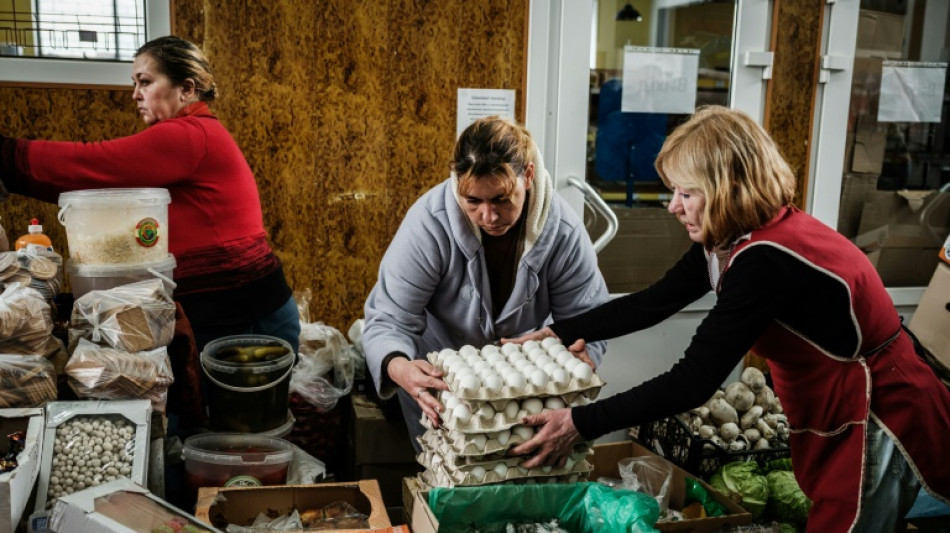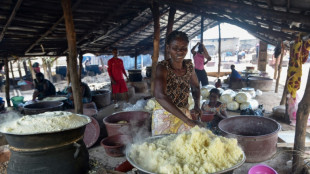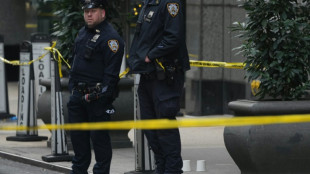
-
 UK's Starmer offers 'plan for change' in reset bid after 150 days
UK's Starmer offers 'plan for change' in reset bid after 150 days
-
South Korea president clings to power after martial law U-turn

-
 Presidential vote seen as referendum on Romania's European future
Presidential vote seen as referendum on Romania's European future
-
Hamilton bids farewell to Mercedes as Ferrari vie for title

-
 New Zealand unchanged in bid to hit back against England
New Zealand unchanged in bid to hit back against England
-
Macron seeks remedy to France's political crisis

-
 New Natalia Lafourcade album celebrates music's onstage evolutions
New Natalia Lafourcade album celebrates music's onstage evolutions
-
Taiwan's Lai kicks off visit to US territory Guam

-
 Ivory Coast staple cassava meal gains UNESCO heritage status
Ivory Coast staple cassava meal gains UNESCO heritage status
-
OpenAI to partner with military defense tech company

-
 Liverpool held but Slot salutes 'special' Salah
Liverpool held but Slot salutes 'special' Salah
-
Man City needed to break losing 'routine', says Guardiola

-
 Leipzig down Frankfurt to reach German Cup quarters, Cologne strike late
Leipzig down Frankfurt to reach German Cup quarters, Cologne strike late
-
Mbappe admits penalty miss 'big mistake' as Bilbao beat Real Madrid

-
 'Sad, disappointed' Mbappe pays penalty as Bilbao beat Real Madrid
'Sad, disappointed' Mbappe pays penalty as Bilbao beat Real Madrid
-
US stocks surge to records, shrugging off upheaval in South Korea, France

-
 Liverpool held in Newcastle thriller, Arsenal inflict Amorim's first defeat
Liverpool held in Newcastle thriller, Arsenal inflict Amorim's first defeat
-
Shiffrin confirms she'll miss Beaver Creek World Cup races

-
 Corner kings Arsenal beat Man Utd to close gap on Liverpool
Corner kings Arsenal beat Man Utd to close gap on Liverpool
-
Mbappe pays penalty as Bilbao beat Real Madrid

-
 NFL Jaguars place Lawrence on injured reserve with concussion
NFL Jaguars place Lawrence on injured reserve with concussion
-
North Korea, Russia defence treaty comes into force

-
 Openda hits brace as Leipzig beat Frankfurt in German Cup last 16
Openda hits brace as Leipzig beat Frankfurt in German Cup last 16
-
Schar punishes Kelleher blunder as Newcastle hold Liverpool in thriller

-
 De Bruyne masterclass helps Man City end seven-game winless streak
De Bruyne masterclass helps Man City end seven-game winless streak
-
Syrian rebels surround Hama 'from three sides', monitor says

-
 Lawyers seek leniency for France rape trial defendants, blaming 'wolf' husband
Lawyers seek leniency for France rape trial defendants, blaming 'wolf' husband
-
OpenAI chief 'believes' Musk will not abuse government power

-
 Thousands rally in Georgia after police raid opposition offices
Thousands rally in Georgia after police raid opposition offices
-
S. Korea opposition push to impeach president

-
 Powell 'not concerned' US Fed would lose independence under Trump
Powell 'not concerned' US Fed would lose independence under Trump
-
French government falls in historic no-confidence vote

-
 Syrian White Helmets chief 'dreams' of never pulling a body out of rubble again
Syrian White Helmets chief 'dreams' of never pulling a body out of rubble again
-
NBA Suns lose Durant for at least a week with ankle injury

-
 Warhammer maker Games Workshop enters London's top stocks index
Warhammer maker Games Workshop enters London's top stocks index
-
Iran Nobel winner released for three weeks, 'unconditional' freedom urged

-
 Red Cross marks record numbers of humanitarians killed in 2024
Red Cross marks record numbers of humanitarians killed in 2024
-
Johnson's Grand Slam 'no threat', says World Athletics boss Coe

-
 Qatar's emir and UK's Starmer talk trade as state visit ends
Qatar's emir and UK's Starmer talk trade as state visit ends
-
Cuba suffers third nationwide blackout in two months

-
 Russia, Ukraine to send top diplomats to OSCE summit in Malta
Russia, Ukraine to send top diplomats to OSCE summit in Malta
-
Spanish royals to attend memorial service for flood victims

-
 LPGA, USGA new policy requires female at birth or pre-puberty change
LPGA, USGA new policy requires female at birth or pre-puberty change
-
Stick to current climate change laws, US tells top UN court

-
 British Museum chief says Marbles deal with Greece 'some distance' away
British Museum chief says Marbles deal with Greece 'some distance' away
-
Pope Francis receives electric popemobile from Mercedes

-
 Gaza civil defence: thousands flee Israeli strikes, evacuation calls
Gaza civil defence: thousands flee Israeli strikes, evacuation calls
-
Trump names billionaire private astronaut as next NASA chief

-
 Pidcock to leave INEOS Grenadiers at end of season
Pidcock to leave INEOS Grenadiers at end of season
-
Seoul stocks weaken, Paris advances despite political turmoil


In north Donbas, denial and fatalism face Russian onslaught
After two months of sustained Russian artillery fire, the hamlet of Lysychansk, located just 14 kilometres (nine miles) from Russian ground forces, has turned into a ghost town.
Most residents have left: shops are closed, windows sealed with wooden planks and doors barricaded.
Only a small sheltered market in the centre of town is still operating, providing food and other supplies. The town's other market was bombed.
"Those who stayed come out of their cellars in the morning and rush here to see if there is anything left, quickly do some shopping and return [to] their shelters," explains Tatyana Ivanenko, standing behind a bread counter.
The 45-year-old merchant says she leaves the market "as soon as I have sold the last one", adding that she is determined to feed her town until the end.
On Friday, the rain appeared to have delayed the now traditional morning exchange of artillery fire between Russian and Ukrainian troops, as about a hundred people gathered under the market's glass ceiling.
The size of the crowd makes everyone nervous.
"Everyone, this is going to end badly," says an elderly woman in line for vegetables, fearing a targeted strike by Russian forces similar to a deadly train station rocket attack in the nearby town of Kramatorsk on April 8 that killed at least 52 people.
- Nowhere to go -
In Severodonetsk, 10 kilometers (six miles) from Russian positions, the city's volunteers and medical personnel are holding the fort in a local hospital that is littered with broken windows and where some floors are plunged into darkness.
Shelling resumed recently, and the city is likely to soon be surrounded by advancing Russian troops.
"We will stay here until the last patient," says Roman Vodianik, the hospital's chief, whose office is decorated with Orthodox Christian icons.
While the operating room on the hospital's seventh floor is still functional, it is reserved for life-threatening emergencies. The main mission of the hospital, in what are likely its final days, is to host those who have nowhere else to go.
One of those taking refuge here is Yuliana Alekseena, 81, who came from a nearby town that is now occupied by Russian forces.
"My house was bombed and burned down," said the elderly woman, whose hand was wrapped in a bandage.
- 'Last chance' -
The last civilians remaining in Severodonetsk gather in the basement of the Ostchem nitrogen plant, hoping to wait out a feared Russian offensive.
The huge concrete bunker from the Soviet era holds 167 people, including families with children who crowd together day and night in unsanitary conditions amid the roar of the plant's machines.
"We are fed, we have soup and borscht, a big barrel for 160 people," says Zinaida Dymovskykh, 66, sitting on a cot.
Despite the bombardment, Ukrainian Red Cross ambulances have come here to try to evacuate the civilians.
"The situation is getting worse, our priority is to evacuate the disabled and the elderly who want to leave but can't, this is probably their last chance," says volunteer Oleksandr Chernysh.
A dying 92-year-old woman is carried out from the bunker on a stretcher.
"She will not make it to the hospital alive," laments one of the paramedics.
K.Thomson--BTB




